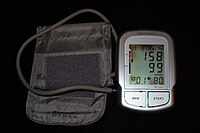
Photo from wikipedia
Hypertriglyceridemia, defined as serum triglyceride (TG) levels >150 mg/dL, now affects over one-quarter of the US adult population and is associated with an increased risk of atherosclerotic cardiovascular disease. Available guidelines… Click to show full abstract
Hypertriglyceridemia, defined as serum triglyceride (TG) levels >150 mg/dL, now affects over one-quarter of the US adult population and is associated with an increased risk of atherosclerotic cardiovascular disease. Available guidelines for managing hypertriglyceridemia vary with respect to TG thresholds and severity of disease. Lifestyle modifications and management of secondary causes (eg, diabetes) remain the first step in managing hypertriglyceridemia, with pharmacotherapy reserved to reduce the risk of pancreatitis and/or further reduce TG levels. Several classes of lipid-lowering agents are available with variable TG-lowering efficacy. Although there is no consensus regarding the choice of initial TG-lowering pharmacotherapy, there is general agreement that the decision depends on the degree of hypertriglyceridemia and atherosclerotic cardiovascular disease risk. This review will discuss available and emerging lipid-lowering therapies for the management of moderately elevated TG, defined as TG 150 to 499 mg/dL.
Journal Title: Journal of clinical lipidology
Year Published: 2017
Link to full text (if available)
Share on Social Media: Sign Up to like & get
recommendations!